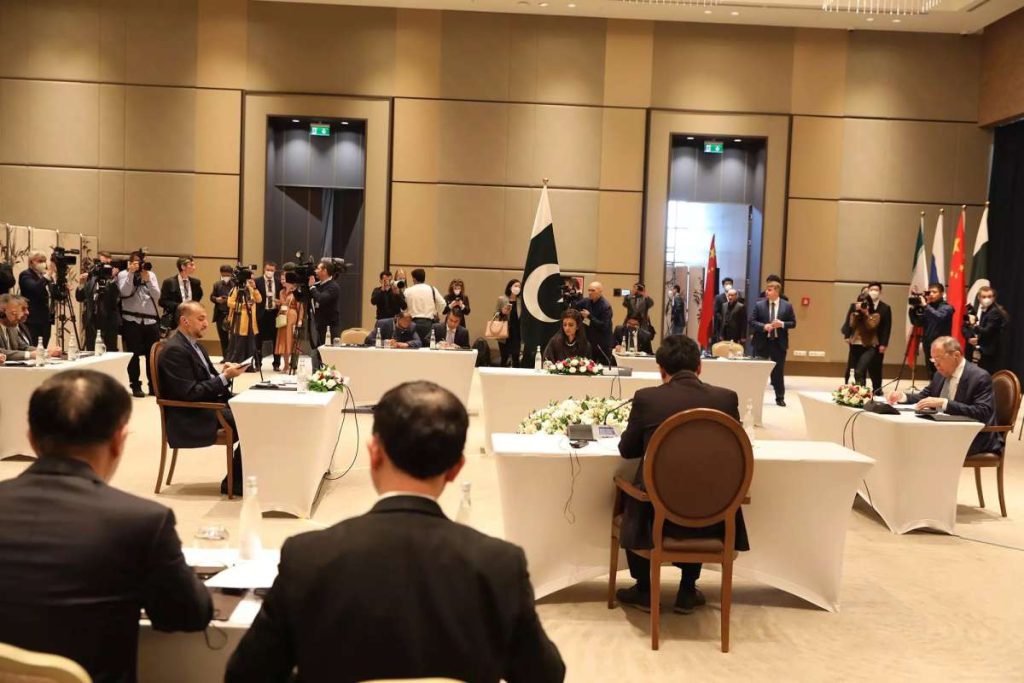
The foreign ministers of China, Russia, Iran and Pakistan met in Samarkand, Uzbekistan, in the framework of the 4th Ministers’ meeting of Afghanistan’s neighbouring countries….reports Asian Lite News
China, Russia, Iran and Pakistan in the second informal meeting among their Foreign ministers on Thursday, released a joint statement calling on Taliban to form an inclusive government, Pakistan based Khaama Press reported.
The meeting was held in Samarkand, Uzbekistan, in the framework of the 4th Ministers’ meeting of Afghanistan’s neighbouring countries. A joint statement called on the Taliban to form an inclusive government with the participation of all ethnic groups and political institutions.
The statement also asked the Taliban to lift all restriction measures against women and ethnic minorities in the country.
The statement also emphasized that a peaceful Afghanistan is in the international community’s interest and that the country should be a place for international cooperation rather than geopolitical rivalry, according to Khaama Press.
The US and its allies were blamed for the current state of affairs in the country and asked for the immediate lifting of unilateral sanctions against Afghanistan and releasing its assets to benefit the people.
Russia, China, Iran and Pakistan also expressed concern about the security situation and the growing terrorism in Afghanistan. It reiterated that terrorist groups based in Afghanistan severely threaten regional and global peace.
The countries asked Taliban to “take tangible action in fighting against terrorism and eliminating terrorist groups in the country.”
Taliban spokesperson Zabiullah Mujahid recently called on the international community to pursue engagement instead of putting pressure on the Taliban, Afghanistan-based TOLO News reported.
It has been two years since the Taliban came to power in Afghanistan, but no countries have yet recognized it.
“Pressure, imposition of pressure and threats, these methods should be put aside, and they should engage with the Islamic Emirate so that the Islamic Emirate can take responsible actions regarding some issues, some laws and other issues in the world,” Mujahid said, as quoted by TOLO News reported.
Mujahid in an interview with Afghanistan-based television channel Radio Television Afghanistan (RTA) said that Daesh has been controlled and conducts attacks secretly and is considered a “1 per cent problem.”

Clerics call for women education
As Afghan females continue to suffer under Taliban’s hardline regime, religious clerics of the country have called upon the Taliban to ensure access of educational opportunities, TOLOnews reported.
The hijab shouldn’t be used as a justification to prohibit women from receiving an education, according to Abdul Sami Ghaznavi, a lecturer at the Central Jihadi Madrasa, and teaching women is one of the responsibilities of the Islamic government, the Afghan news agency reported. “Education is not a problem in the eyes of Sharia. Mohammadullah Mohsen, another religious cleric, stated that Islam necessitates that we comprehend and receive education.”
Meanwhile, once more, female students requested from the current administration that schools be opened for them.
“There has been no word about the opening of our schools this year, just like last year.
We are surrounded by uncertainty,” explained student Maryam, according to TOLOnews.
“Under any conditions offered by the current government, all Afghan girls are prepared to continue their studies. It is enough that they open the doors of the schools to us as soon as possible,” another student Fawzia said.
Since 15 August 2021, the de facto authorities have barred girls from attending secondary school, restricted women and girls’ freedom of movement, excluded women from most areas of the workforce and banned women from using parks, gyms, and public bath houses.
Moreover, time and again the UN Security Council has expressed concern over the Taliban’s decision to ban girls from attending school above the sixth grade in Afghanistan.
These restrictions culminate with the confinement of Afghan women and girls to the four walls of their homes. (ANI)
ALSO READ: Afghanistan does not need US-led intervention: Iran


